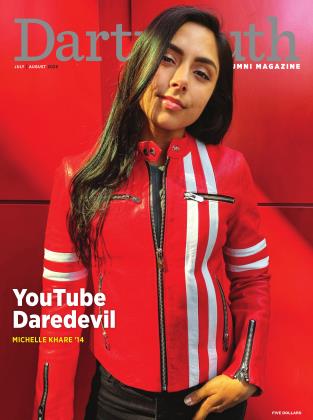Still Smokin’
notebook
CAMPUS
notes from around the green
ENERGY
Pandemic stalls new power plant plans.
Early last year Dartmouth announced a sweeping program to cut, and eventually eliminate, campus greenhouse-gas emissions. Most dramatically, it called for retiring the school’s 121-year-old steam plant, whose smokestack looms over the Green almost as prominently as Baker Tower.
In the midst of the coronavirus pandemic, those plans are less certain. “We are facing much harder choices than we were six months ago,” says Rosi Kerr ’97, Dartmouth’s director of sustainability.
As first proposed, the $200-million plan included upgrades to buildings and converting the campus network of steamheating pipes to a more efficient hot-water system. The heating plant was to be replaced with a new facility burning wood chips instead of oil. Though wood is a renewable fuel—and some experts see it as climate-friendly—that idea sparked some heat. Three prominent alumni, including MIT professor John Sterman ’77, published a memo challenging “the mistaken assumption that a wood-fired heating plant will be of benefit to the College or the world.”
Dartmouth’s sustainability team quickly regrouped, seeking fresh ideas and recruiting new experts, including Sterman. He now serves on two advisory committees that meet virtually. One question they’re grappling with is whether the College’s needs could be met without burning any sort of fuel. Sterman believes it’s possible—with infrastructure upgrades. “Energy efficiency is the fastest, safest, cheapest way to get where we want to be,” he says. The revamped plan will likely rely heavily on geothermal wells, which harness moderate underground temperatures to assist in heating and cooling.
Meanwhile, the heating plant smokestack will stand for at least a few years longer. Because of the pandemic’s financial impact, “large-scale energy investments will probably be pushed down the road,” Kerr says. At the same time, she notes, “turmoil can force you to find new ways to do things.” For example, with most employees learning to work from home, the College might experiment with more efficient ways to use office space.
Sterman believes the school must plan for the long term. “Dartmouth has been around for hundreds of years,” he says, “and we expect it to be here hundreds of years from now.”
Jim Meigs ’80
PROTEST
300
People who assembled on the Green May 30 to speak out against police brutality
GRANTS
5
Undergraduates awarded Fulbright scholarships in May
BOGEY
$200,000
Approximate amount in membership fees refunded by the golf course, which has closed for the year
VIRTUAL VOICES
“You have to keep going. I was 50 when I wrote Gosford Park.”
-SCREENWRITER AND DOWNTON ABBEY CREATOR JULIAN FELLOWES ON A LIVESTREAM CHAT VIA HOP@HOME MAY 9. HE WON AN ACADEMY AWARD FOR GOSFORD PARK, HIS FIRST FILM.
ZOOM ROOM
Senior lecturer Charlie Wheelan ’88 teaches Education 20 from his Rockefeller Hall officehin early spring. "I weuld say the remote teaching went better than expected, but I had to do a lot of things to make that the case,” he says. “It’s definitely not a viable option in the long run.”
 View Full Issue
View Full Issue
More From This Issue
-
 Cover Story
Cover StoryInternet Famous
JULY | AUGUST 2020 By Jennifer Wulff ’96 -
 Interview
Interview“A Failure to Dig Deeper”
JULY | AUGUST 2020 By ABIGAIL JONES ’03 -
 notebook
notebookOne for All, All for One
JULY | AUGUST 2020 By DENIS O’NEILL ’70 -
 notebook
notebookMy Arrest
JULY | AUGUST 2020 By KEITH BOYKIN ’87 -
 notebook
notebookFlex Time
JULY | AUGUST 2020 By ABIGAIL JONES ’03 -
 CLASS NOTES
CLASS NOTESDeaths
JULY | AUGUST 2020
Notebook
-
 notebook
notebookAlums Seek More Accountability
MARCH|APRIL 2019 -
 notebook
notebookCAMPUS CONFIDENTIAL
SEPTEMBER | OCTOBER 2019 -
 notebook
notebookA Sense of Place
JANUARY | FEBRUARY 2023 -
 notebook
notebookOn the Watch
MAY | JUNE 2021 By CHARLOTTE GROSS ’16 -
 notebook
notebookHow to Shoot Better Seines
JULY | AUGUST 2018 By James Napoli -
 notebook
notebookBand on the Run
SEPTEMBER | OCTOBER 2016 By Jessica Fedin ’17

